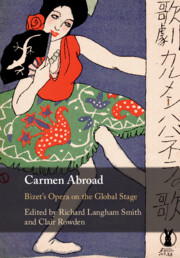Book contents
- Carmen Abroad
- Carmen Abroad
- Copyright page
- Contents
- Figures
- Tables
- Preface
- Acknowledgements
- Notes on Contributors
- Part I Establishment in Paris and the Repertoire
- Part II Across Frontiers
- Part III Localising Carmen
- 17 Russian Carmens and ‘Carmenism’: From Imperial Import to Ideological Benchmark
- 18 The Other Reversed? Japan’s Assimilation of Carmen, 1885 to 1945
- 19 Flamenco and the ‘Hispanicisation’ of Bizet’s Carmen in the Belle Epoque
- 20 Carmen at Home: Between Andalusia and the Basque Provinces, 1845 to 1936
- 21 Carmen in the Midi Amphitheatres: A ‘Tauro-Comique’ Spectacle
- Selected Bibliography
- Index
- References
17 - Russian Carmens and ‘Carmenism’: From Imperial Import to Ideological Benchmark
from Part III - Localising Carmen
Published online by Cambridge University Press: 18 September 2020
- Carmen Abroad
- Carmen Abroad
- Copyright page
- Contents
- Figures
- Tables
- Preface
- Acknowledgements
- Notes on Contributors
- Part I Establishment in Paris and the Repertoire
- Part II Across Frontiers
- Part III Localising Carmen
- 17 Russian Carmens and ‘Carmenism’: From Imperial Import to Ideological Benchmark
- 18 The Other Reversed? Japan’s Assimilation of Carmen, 1885 to 1945
- 19 Flamenco and the ‘Hispanicisation’ of Bizet’s Carmen in the Belle Epoque
- 20 Carmen at Home: Between Andalusia and the Basque Provinces, 1845 to 1936
- 21 Carmen in the Midi Amphitheatres: A ‘Tauro-Comique’ Spectacle
- Selected Bibliography
- Index
- References
Summary
Despite mixed reactions to the first performance of Carmen on the Russian stage in 1878 in Saint-Petersburg, it rapidly became an indispensable part of the country’s operatic repertoire.
After the Revolution, the popularity of Carmen transcended the stage, lending its name to new perfumes and the Toreador’s tune to the ‘March of the Working-Peasants Army’. In theatre, meanwhile, new trends were aligning the opera with the tastes of proletarian audiences. Seemingly embodying the ideological triangle of realism, narodnost (closeness to the ‘people’) and – by some selective argumentation – optimism, Carmen provided a benchmark for new Soviet opera.
With Carmen’s popularity came the abstraction of the heroine from the operatic context. Borrowing from Shakespeare studies and the concept of ‘Hamletism’, this chapter will coin the term ‘Carmenism’ to refer to the tendency to interpret Carmen as a symbol, which in turn influences the interpretation of Carmen the opera, and thus keeps the music and its source alive for the appropriating nation or era. Through the prism of ‘Carmenism’ and using representative case studies, this chapter seeks to demonstrate how the various Russian/Soviet adaptations not only reflected the socio-political context of the country but also had a role in forming that culture.
Keywords
- Type
- Chapter
- Information
- Carmen AbroadBizet's Opera on the Global Stage, pp. 263 - 283Publisher: Cambridge University PressPrint publication year: 2020
References
Newspapers and Periodical Literature
Izvestiia
Nedelia
Novosel’e
Teatr i zhizn’
Vecherniaia Moskva
Zhizn’ iskusstva
Zrelishcha

